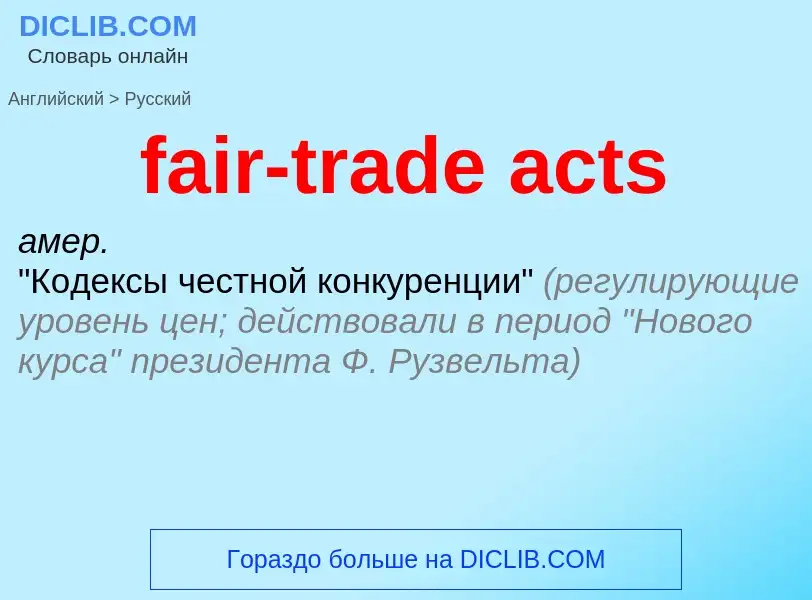Перевод и анализ слов искусственным интеллектом ChatGPT
На этой странице Вы можете получить подробный анализ слова или словосочетания, произведенный с помощью лучшей на сегодняшний день технологии искусственного интеллекта:
- как употребляется слово
- частота употребления
- используется оно чаще в устной или письменной речи
- варианты перевода слова
- примеры употребления (несколько фраз с переводом)
- этимология
fair-trade acts - перевод на русский
"Кодексы честной конкуренции" (регулирующие уровень цен; действовали в период "Нового курса" президента Ф. Рузвельта)
['bukfeə]
существительное
общая лексика
книжная ярмарка
благотворительная распродажа книг (в присутствии авторов)
['treidʃəu]
общая лексика
закрытый просмотр
коммерческий просмотр (для покупателей кинофильма)
показ нового фильма узкому кругу (кинокритикам и представителям проката)
Википедия

Fair trade is a term for an arrangement designed to help producers in developing countries achieve sustainable and equitable trade relationships. The fair trade movement combines the payment of higher prices to exporters with improved social and environmental standards. The movement focuses in particular on commodities, or products that are typically exported from developing countries to developed countries but is also used in domestic markets (e.g., Brazil, the United Kingdom and Bangladesh), most notably for handicrafts, coffee, cocoa, wine, sugar, fruit, flowers and gold.
Fair trade labelling organizations commonly use a definition of fair trade developed by FINE, an informal association of four international fair trade networks: Fairtrade Labelling Organizations International, World Fair Trade Organization (WFTO), Network of European Worldshops and European Fair Trade Association (EFTA). Fair trade, by this definition, is a trading partnership based on dialogue, transparency and respect, that seeks greater equity in international trade. Fair trade organizations, backed by consumers, support producers, raise awareness and campaign for changes in the rules and practice of conventional international trade.
There are several recognized fair trade certifiers, including Fairtrade International (formerly called FLO, Fairtrade Labelling Organizations International), IMO, Make Trade Fair, and Eco-Social. Additionally, Fair Trade USA, formerly a licensing agency for the Fairtrade International label, broke from the system and implemented its own fair trade labelling scheme, which expanded the scope of fair trade to include independent smallholders and estates for all crops. In 2008, Fairtrade International certified approximately (€3.4B) of products.
On 6 June 2008, Wales became the world's first Fair Trade Nation; followed by Scotland in February 2013. The fair trade movement is popular in the UK, where there are over 500 Fairtrade towns, 118 universities, over 6,000 churches, and over 4,000 UK schools registered in the Fairtrade Schools Scheme. In 2011, more than 1.2 million farmers and workers in more than 60 countries participated in Fairtrade International's fair trade system, which included €65 million in fairtrade premium paid to producers for use developing their communities.
Some criticisms have been raised about fair trade systems. One 2015 study concluded that producer benefits were close to zero because there was an oversupply of certification, and only a fraction of produce classified as fair trade was actually sold on fair trade markets, just enough to recoup the costs of certification. A study published by the Journal of Economic Perspectives, however, suggests that Fair Trade does achieve many of its intended goals, although on a comparatively modest scale relative to the size of national economies. Some research indicates that the implementation of certain fair trade standards can cause greater inequalities in some markets where these rigid rules are inappropriate for the specific market. In the fair trade debate there are complaints of failure to enforce the fair trade standards, with producers, cooperatives, importers, and packers profiting by evading them. One proposed alternative to fair trade is direct trade, which eliminates the overhead of the fair trade certification and allows suppliers to receive higher prices much closer to the retail value of the end product. Some suppliers use relationships started in a fair trade system to autonomously springboard into direct sales relationships they negotiate themselves, whereas other direct trade systems are supplier-initiated for social responsibility reasons similar to a fair trade systems.


![Fair trade [[coffee bean]]s being sorted Fair trade [[coffee bean]]s being sorted](https://commons.wikimedia.org/wiki/Special:FilePath/Coffee beans being sorted and pulped.jpg?width=200)
![Fairtrade bananas from the [[Dominican Republic]] Fairtrade bananas from the [[Dominican Republic]]](https://commons.wikimedia.org/wiki/Special:FilePath/Fair-Banana.jpg?width=200)

![Display of Fairtrade products at the [[Derbyshire County Council]] head office Display of Fairtrade products at the [[Derbyshire County Council]] head office](https://commons.wikimedia.org/wiki/Special:FilePath/Faitrade display.jpg?width=200)

![Oxfam shop]] on [[Drury Lane]] in [[Covent Garden]], [[London]] Oxfam shop]] on [[Drury Lane]] in [[Covent Garden]], [[London]]](https://commons.wikimedia.org/wiki/Special:FilePath/Oxfam shop on Drury Lane.jpg?width=200)

.jpg?width=200)

![[[IBM]] stand during [[CeBIT]] 2010 at the [[Hanover Fairground]], the largest exhibition ground in the world, in [[Hanover]], [[Germany]] [[IBM]] stand during [[CeBIT]] 2010 at the [[Hanover Fairground]], the largest exhibition ground in the world, in [[Hanover]], [[Germany]]](https://commons.wikimedia.org/wiki/Special:FilePath/IBM CeBIT 2010.jpg?width=200)
![A small trade show in [[Croatia]], with the exhibition booth of the [[Croatian Chamber of Economy]] A small trade show in [[Croatia]], with the exhibition booth of the [[Croatian Chamber of Economy]]](https://commons.wikimedia.org/wiki/Special:FilePath/MESAP 2017. - štand HGK.jpg?width=200)
